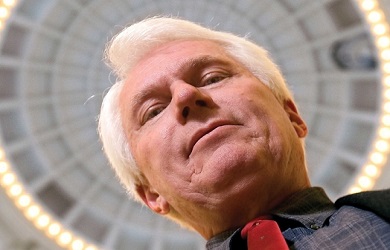I always thought that when conservatives used the phrase “states’ rights,” it meant that the federal government was to have limited powers and the individual states were to have the right to decide how to legislate issues for themselves.
Once upon a time, Gov. Rick Perry was a supporter of that idea … until he decided he wanted to run for president and realized that “states’ rights” meant that states could recognize marriage equality and a woman’s right to choose.
Seeing as such things are diametrically opposed to the agenda of the Religious Right base he needs to court to win the GOP nomination, Perry quickly flip-flopped on that position, announcing his support for constitutional amendments to outlaw both abortion and gay marriage.
But make no mistake, Perry’s cowardly pandering has not gone unnoticed by those he seeks to court … but don’t imagine that they are holding it against him becuse they are not. In fact, Bryan Fischer is praising and defending Perry for taking this stand by unveiling a rather novel new definition of what the term “states’ rights” really means:
Gov. Rick Perry has been castigated by some conservatives and 10th Amendment aficionados for his public support of federal amendments to protect the sanctity of life and the sanctity of marriage.
They accuse him of abandoning his commitment to federalism, states’ rights, and the 10th Amendment and committing unpardonable Tea Party heresy in the process
But to consider amending the federal Constitution as an abandonment of the 10th Amendment and states’ rights absurd.
You can’t get any more “states’ rights” than amending the Constitution, for one simple reason: only the states can amend the Constitution in the first place.
Unless proponents can get voters in 38 states to agree with them, our supreme legal document remains unchanged.
When the Constitution is amended, this is the exact opposite of the federal government imposing something on the states, but is rather a manifestation of the states expressing their political will. If anything, it’s the states imposing something on the federal government. Everybody ought to get pumped up about doing something like that.
So it turns out that “states’ rights” doesn’t mean that the states have the right to decide the issues as they see fit, but rather that the majority of the states have the right to decide what the minority must do.
Is this any surprise, coming from a man who doesn’t believe the First Amendment covers non-Christians?






